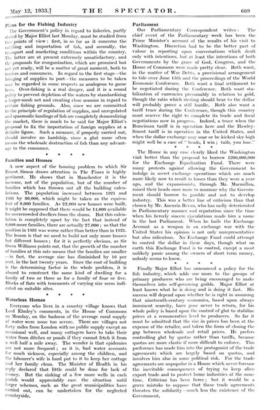Finally Major Elliot has announced a policy for the fish
industry, which adds one more to the groups of primary producers who are being encouraged to make themselves into self-governing guilds. Major Elliot at least knows what he is doing and is doing it fast. His success will depend upon whether he is right in assuming that nineteenth-century economics, based upon always imminent scarcity, have gone never to return, for his whole policy is based upon the control of glut to stabilize prices at a remunerative level to producers. So far it must be admitted that the rise in prices has been at the expense of the retailer, and taken the form of closing the gap between wholesale and retail prices. He prefers controlling glut by quotas rather than tariffs, because quotas are more elastic if more difficult to enforce. This preference has made him into the protagonist of the trade agreements which are largely based on quotas, and involves him also in some political risk. For the trade agreements are unpopular in a House which never foresaw the inevitable consequences of trying to keep alive export trade and to protect home industries at the same time. Criticism has been fierce ; but it would be a grave mistake to suppose that these trade agreements threaten the solidarity—much less the existence of the Government,
































 Previous page
Previous page